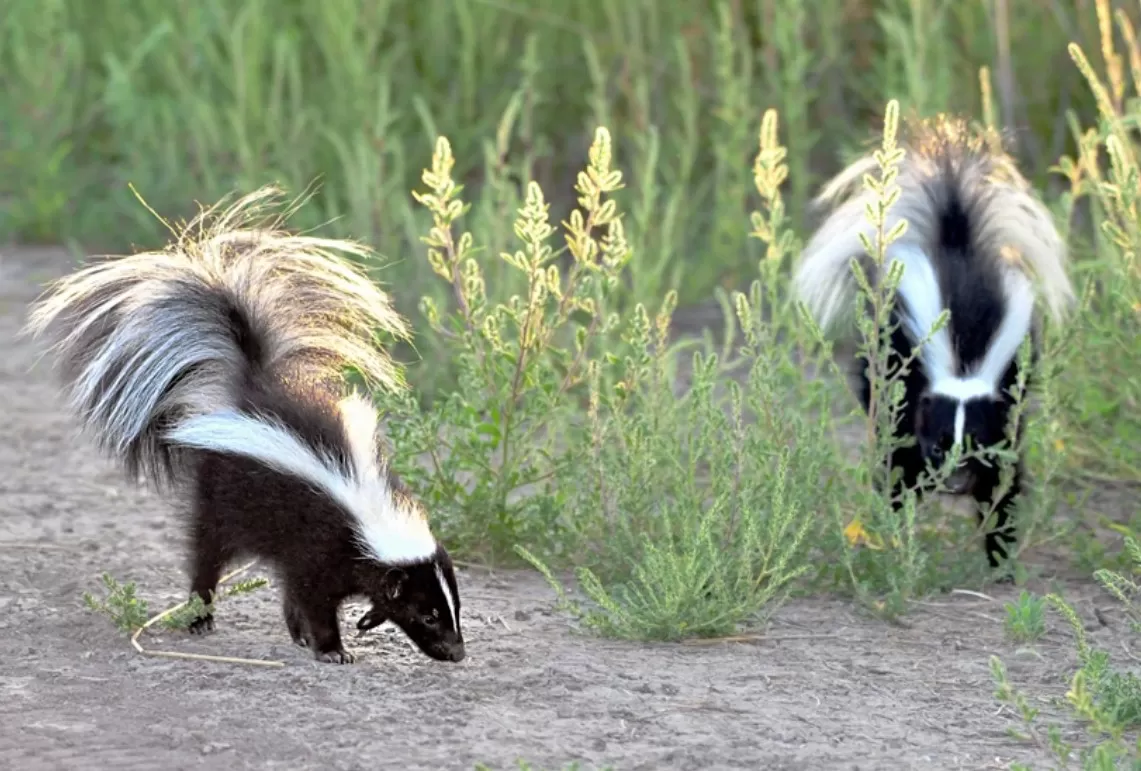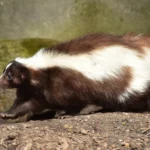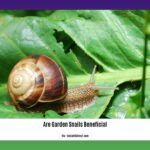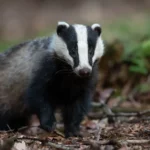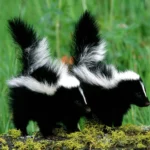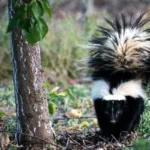Skunks, with their iconic black and white fur and infamous odor, are notorious for their curious exploration of suburban backyards. While often associated with their pungent spray, these creatures harbor a lesser-known secret: a fondness for birdseed. This comprehensive guide delves into the reasons behind their attraction to bird feeders, their feeding habits, and effective strategies to safeguard your feathered friends and gardens from these masked bandits.
Do Skunks Eat Bird Seed?
Yes, indeed! Skunks are opportunistic omnivores, meaning their diet encompasses both plants and animals. While their preferred meals consist of insects, small mammals like mice and voles, fruits, and vegetables, they won’t hesitate to capitalize on an easily accessible food source – including your backyard bird feeder.
This tendency to indulge in birdseed is particularly pronounced during the fall and winter months. As temperatures plummet and natural food sources dwindle, skunks become increasingly reliant on readily available sustenance. Bird feeders, brimming with nutrient-rich seeds, transform into a tempting target for these hungry creatures.
However, it’s important to note that skunks aren’t particularly adept climbers. They favor foraging on the ground, making ground-feeding birds and, unfortunately, chicken coops particularly vulnerable to their raids. These mischievous critters will readily gobble up spilled seed or even attempt to breach chicken coops in search of eggs, often leaving a trail of disarray in their wake.
Here’s a quick look at the pros and cons of skunks developing a taste for birdseed:
| Pros | Cons |
|---|---|
| Provides a crucial food source during lean times | Can lead to damage or destruction of bird feeders |
| Convenient and easily accessible food | May attempt to enter chicken coops, posing a risk to poultry |
While the image of aiding a hungry skunk through a harsh winter might seem heartwarming, it’s generally advisable to discourage their dependence on bird feeders. Elevated feeders or platforms positioned beyond their reach can serve as effective deterrents, ensuring your feathered companions receive their treats without unintentionally attracting these unwelcome guests.
What Else Do Skunks Eat?
As mentioned earlier, skunks are incredibly adaptable omnivores, their diet reflecting their opportunistic nature. Think of them as nature’s scavengers, willing to consume a wide array of food sources to survive. While birdseed might be a convenient snack, their palates extend far beyond this simple fare.
Here’s a closer look at the diverse menu that skunks enjoy:
| Category | Examples |
|---|---|
| Insects | Beetles, crickets, grasshoppers, grubs |
| Small Mammals | Mice, voles, rabbits |
| Fruits | Berries, apples, grapes |
| Vegetables | Corn, tomatoes, squash |
| Other | Bird eggs, carrion (dead animals), pet food, garbage |
That’s right, even your garbage isn’t safe from these resourceful eaters! Their remarkable adaptability allows them to thrive in a variety of environments, their diet shifting with the seasons and availability of food.
It’s this opportunistic nature that draws them to bird feeders. While not their primary food source, birdseed, particularly the high-fat sunflower seeds favored by birds, provides a readily available source of energy, especially during the colder months when other food is scarce.
How Can I Keep Skunks Away From Bird Feeders?
Discovering that skunks have developed a taste for your birdseed can be disheartening. The telltale signs of their nocturnal visits—disappearing seed, tipped-over feeders, and that unmistakable musky odor—are a clear indication that you need to take action.
Fortunately, several effective strategies can deter these masked bandits and keep your birdseed safe for its intended recipients:
1. Choose the Right Feeder: Opt for feeders that are elevated and equipped with sturdy metal guards or cages. This design makes it significantly more challenging for skunks to access the seeds.
2. Maintain a Clean Feeding Area: Scattered seed on the ground acts as an open invitation for skunks. Regularly clean up any spilled seed to minimize temptation.
3. Illuminate Your Yard: Skunks are creatures of the night and prefer to operate under the cover of darkness. Installing motion-activated lights around your feeders can startle and deter them.
4. Think Beyond the Feeder: Remember, birdseed isn’t the only item on a skunk’s menu. They’ll gladly explore your garbage or raid your garden if given the opportunity. Secure your trash cans with tight-fitting lids and consider fencing in vulnerable plants.
5. Create a Barrier: Deter skunks from approaching your feeders by creating a physical barrier. This could be a ring of prickly mulch, gravel, or a more substantial fence made from chicken wire or hardware cloth, buried several inches underground to prevent digging.
6. Motion-Activated Sprinklers: These devices serve as harmless but effective deterrents. When they detect movement, they release a short burst of water, encouraging skunks to seek sustenance elsewhere.
7. Remove Feeders at Night: Since skunks are most active after dark, consider bringing your bird feeders inside each evening or covering them securely with a sturdy, lidded container.
By implementing these preventative measures and maintaining a clean and uninviting yard, you can enjoy the delightful company of your feathered friends without unintentionally attracting these unwelcome, albeit fascinating, creatures.
Remember, nature is full of fascinating interactions and interconnected relationships. If you’d like to delve deeper into the world of skunks and their place in the animal kingdom, you can explore topics such as:
By understanding the feeding habits and behaviors of these often-misunderstood creatures, we can foster a harmonious coexistence with the natural world around us.
- Unlock Water’s Symbolism: A Cross-Cultural Exploration - April 20, 2025
- Identify Black and White Snakes: Venomous or Harmless? - April 20, 2025
- Unlocking Potential: Origins High School’s NYC Story - April 20, 2025
